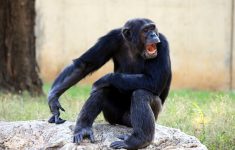Should Chimps Have Legal Rights?

It’s well known that chimpanzees are intelligent – they can perform complex mathematical calculations, play competitive games such as chess and poker, and even communicate. They also have excellent short-term memories and are even able to drive modified cars.
But even though they’re smart, they’re still classified as “animals”. And animals don’t have the kinds of rights that humans do. But should they?
American lawyer and professor Stephen Wise argues that chimps should enjoy some of the same legal rights as humans. In fact, he has dedicated more than 30 years of his life to the cause, and a US court is going to explore the question later this month.
The case of Hercules and Leo may make history
According to media reports, Wise is using an anti-slavery law to support his views. Just as slaves were treated as possessions, he says that is how we treat animals:
“… it is time to take the next step and recognise that certain animals cannot continue to be exploited as property.”
Wise and his organisation, the Nonhuman Rights Project (NhRP), have taken on the plight of two male chimpanzees, Hercules and Leo, who are being held at a US university as part of a study into how human beings evolved to being able to walk upright.
The argument is that because chimps are highly intelligent – because they have such complex cognitive abilities – they are autonomous beings. Any being that is autonomous ought to be allowed to live an autonomous life, and an autonomous being should not be detained.
The group has filed a writ of habeas corpus against the university. That is, they are seeking court orders that the detention of the chimps is unlawful.
In a ground-breaking decision, the court has ruled that the university should show cause for holding the chimps. The hearing will focus on whether the chimps have a legal personality. Wise argues that if they do, they have the capacity for legal rights. Wise hopes that such a finding would entitle the chimps to freedom and protection from medical and other procedures carried out in the name of scientific research.
Rather than campaigning for chimps to have the same rights as humans, for example the right to drive a car or enter into a contract, Wise is seeking physical freedom for intelligent animals as a basic right. He believes chimps should have the freedom to live amongst other chimps, just as whales should have the freedom to swim in the ocean without being hunted.
The rise of animal law as a practice area
Animal law is an area of legal practice that focuses on the status of animals and the issues involved in human-animal interactions, and it is rapidly growing both in Australia and abroad.
In the US, about 140 law schools offer animal law as a subject. In Australia, 11 law schools are offering or planning to offer similar subjects.
In Australia various pieces of legislation prohibit cruelty to animals, and the RSPCA has certain powers to inspect and launch prosecutions where animal cruelty is alleged. There are also animal rights organisations that are increasingly raising awareness.
Once such organisation is Voiceless, which advocates for animals in such areas as:
- Kangaroo hunting.
- Factory farming.
- Chicken production.
- Transparent labelling of meat products.
- Live export.
- Battery hens.
Animals Australia is also dedicated to the protection of all creatures great and small, and has done a great deal of admirable work to address issues of cruelty and exploitation.
Community attitudes towards animal cruelty
There are growing community concerns about the maltreatment of animals in Australia and across the globe. Over recent years, there have been a number of shocking media reports of cruelty to animals.
When the ABC aired its graphic story on the live export of animals to Indonesia, there was such a public outcry that the federal government was forced to intervene and impose regulations on the industry.
There are the horror stories associated with puppy farms, moon bear farming in which bile is painfully extracted from live caged bears, and the terrible, cramped conditions of battery hens. More recently, the practices of some sections of the greyhound industry have come to light, in which live possums, rabbits or piglets are used as lures.
Changes to the law in Australia?
If, as a community, we are horrified by innocent animals being so cruelly treated, perhaps it is not such a jump for Wise and the NhRP to be seeking recognition of legal rights for some animals.
While there is no similar legal case in Australia, the RSPCA is advocating a consistent approach to animal cruelty laws across the nation, specifically:
- Recognition of animals as sentient.
- All forms of animal cruelty to be prohibited.
- Imposing five basic requirements to promote animal welfare.
- Enforcement of legislation and penalties.
Animal welfare is a huge issue and a growing legal area. Whether the chimps Hercules and Leo are granted legal rights is uncertain, but the fact that a court is willing to entertain submissions on the matter is a giant legal step, and appears to be in line with community concerns and expectations.






